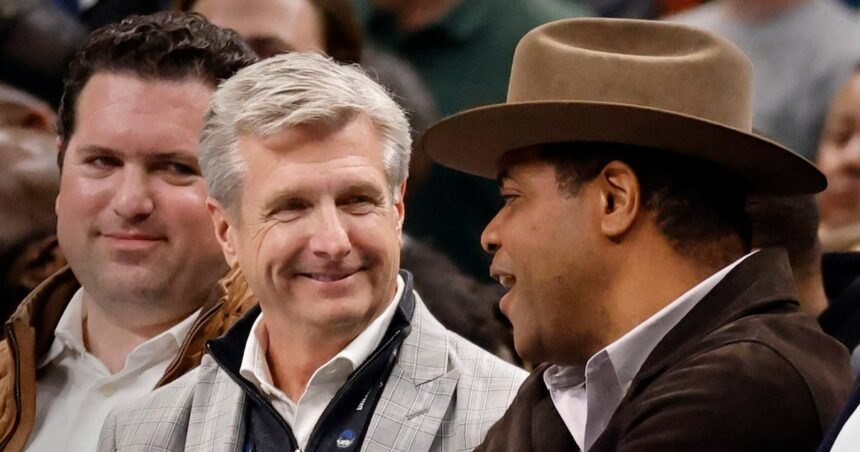In January, his hectic-but-exhilarating first month as Mavericks CEO, Rick Welts unpacked, bought furniture, turned 72 and found the optimal route to walk his rescue terriers, Rafa and Lola.
He launched a whirlwind listening tour of Mavericks employees, corporate partners and city leaders and says he was blown away by Dallas’ energy and friendliness.
Then came the night of Feb. 1. The abrupt halt of Welts’ honeymoon. The Mavericks traded beloved Luka Doncic to the despised Lakers, plunging Dallas fans into chaos.
Welts and the Mavericks’ business staff leapt into crisis management mode as shock boiled into anger, with fans phoning and emailing to vent and in some cases cancel season tickets.
“I thought I’d seen everything in my 47 years in the NBA, but clearly this was different,” Welts said. “I think a lot of people of good intent tried to do the right thing.
“I probably underestimated the reaction. I think we’ve done the best we can, basically, with the staff and trying to do the right thing with everybody who touches the Mavericks.
“It’s incredibly emotional, an incredibly difficult time for so many people. But I still believe we’re going to come out on the other side, with a future that’s incredibly bright. That’s kind of my glass-half-full approach there.”
Candor. Empathy. Optimism. Superlative messaging. It’s little wonder Welts, a Naismith Memorial Basketball Hall of Famer, is widely regarded as the best executive in NBA history.
When Welts came out of NBA retirement to succeed Cynt Marshall as Mavericks CEO, he unknowingly added to his decades of firsts, becoming the only person to oversee business operations of three NBA franchises following stints with Phoenix (2002-2011) and Golden State (2011-2021).
“I told him it was always going to be interesting; that we’re going to have a lot going on in Dallas,” Mavericks governor Patrick Dumont said.
Dumont declined to specify when Welts learned Dallas was trading its superstar, but he says Welts “took it in stride. He immediately realized we needed to spend time working with our fans and that we needed to explain what we were doing.
“He’s been showing great leadership, working with our internal team to make sure they understand what happened because it was a big surprise to them. Luka grew up in this organization; there was an emotional connection to him and we have to respect that.”
In all other respects it’s an especially gratifying week for Welts, a sublime intersection of his accomplished past, the present and the vision he and Dumont share for Dallas’ future.
The Warriors were in Dallas to face the Mavericks Wednesday night, an appetizer to this weekend’s NBA All-Star Game and festivities in San Francisco, where the Welts Effect will be on glittering display.
In 1984, his third of 17 years as an executive in NBA headquarters, Welts largely conceived the expanded All-Star weekend extravaganza as it exists today.
He also played an essential role in seven years of planning and building this weekend’s main venue, the $1.4 billion Chase Center. It’s a Warriors crown jewel, along with winning four NBA titles since 2014 and soaring past the Lakers and Knicks to become the league’s most valuable franchise: $8.8 billion, according to Forbes.
At the moment many Mavericks fans might not feel like gazing through the billowing smoke of the Doncic trade, but the Warriors’ overall prosperity is Dumont-Welts’ rough blueprint for the Mavericks, as are the Chase Center and the Clippers’ new $2 billion Intuit Dome.
Welts told The Dallas Morning News much of his first year as CEO will be spent addressing the Mavericks’ arena needs, though he and Dumont stress the franchise intends to fulfill its American Airlines Center lease, which expires in July 2031.
“This will look nothing like Chase Center; it will look nothing like the Intuit Dome,” Welts said. “This will hopefully be the greatest expression of what Maverick fans would expect when they walk into the arena to see a Mavericks game.
“It will have everything about Texas and Dallas that we can bring to it, to give it a shape and form that will be a foundation for economic competition over the next 30 or 40 years.”
Welts said Dumont has handed him a blank sheet of paper when it comes to a new arena: Use imagination; no limitations.
“See, that’s why you do these,” Welts said. “You have the opportunity to incredibly enhance the experience of attending a Mavericks game.
“Then you have the ability to create an economic engine that will allow the Mavericks to compete for player talent and championships — as far into the future as I can see.”
Welts’ NBA pedigree
To understand the breadth and depth of Welts’ NBA stature, know that he gave eulogies at the memorial services of longtime NBA commissioner David Stern (2020) and Celtics great Bill Russell (2022).
Welts sits on the Naismith Hall of Fame’s Board of Governors. His previous NBA employer, Warriors governor and CEO Joe Lacob, said he’s surprised Dumont was able to lure Welts out of NBA retirement.
“Patrick made the best possible hire he could have made, under any circumstance,” Lacob said.
Dumont and Welts were linked by a persuasive matchmaker: NBA commissioner Adam Silver.
It’s no accident when NBA Sales & Marketing teams gathered in Miami in mid-January for their annual meeting and awards ceremony, Silver began his opening remarks by smiling at Welts and welcoming him back to the NBA.
“I think Adam would permit me to say that he was instrumental in me taking this job,” Welts said. “He spent some time counseling me and he certainly spent some time counseling Patrick before we agreed this was what we wanted to do going forward.
“So he might be a little invested in the success here.”
Silver and Welts share cherished experience, and scar tissue, of being mentored by the brilliant, relentless and uncompromising Stern.
Welts in 1982 was the 35th employee hired under then-executive vice president Stern, who rose to commissioner in 1984. By the time Welts departed in 1999, as third in command, the NBA had 1,100 employees globally.
Silver joined the NBA in 1992, became deputy commissioner in 2006 and succeeded Stern as commissioner in 2014.
“Rick taught me so much about the business of the NBA in my early years in the league office,” Silver told The News by email. “He leads with integrity and humility and has been an important sounding board for me throughout my career.
“I’ve always valued his unique perspective as a proven leader at both the league and team level.”
Building a basketball life
It’s no exaggeration to say Welts has experienced every level of NBA operations, starting after a serendipitous occurrence in 1969.
As if it were yesterday, Welts vividly describes the day his life changed, as a 16-year-old sitting in the back of English literature in Seattle’s Queen Anne High School.
His friend Earl Woodson, considered by Welts to be the coolest kid in school because he was a Seattle SuperSonics ballboy, was visibly upset that day as he took his usual seat near Welts.
“My family is moving out of town,” Woodson sighed to Welts, who tried his best to appear sympathetic while asking Woodson to introduce him to whoever hired Sonics ballboys.
“If that day hadn’t happened,” Welts says 56 years later, “I wouldn’t be sitting here talking to you.”

When the Sonics debuted as an expansion team in 1967, becoming Seattle’s first major sports franchise, it felt surreal to young Welts to attend games with his father and watch the likes of Russell, Wilt Chamberlain and Oscar Robertson in person.
Now he not only got to attend every home game but also sat near the bench, and within six months, he was promoted to assistant equipment manager.
“Do you know how many degrees it takes now to become an assistant equipment manager?” he chuckled. “What it meant then is I knew how to use the washer and dryer and have the uniforms hanging in the right locker.”
He forged what would become a lifelong friendship with player-coach Lenny Wilkens and player-assistant coach Rod Thorn, the latter of whom joined Welts in the 2018 Naismith Hall of Fame Class, along with, among others, future Mavericks coach Jason Kidd.
Perhaps most surreal was when Russell became the Sonics’ coach and general manager in 1973. Welts continued to work for the team while attending the University of Washington, and upon his 1975 graduation became media relations director at 24.
In those early years, Saturday mornings began with Russell summoning the “white boy down the hall,” but along the way, they formed a lifelong friendship that led to the coach serving as one of his HOF presenters, along with Stern and Wilkens.
Welts says he learned a lot about character from famous athletes who treated a wide-eyed kid with respect.
“And when you’re a fly on the wall, in the locker room for pregame and postgame, you get to see private interactions – players, coaches, trainers, doctors, media, ownership,” he said. “It was like an MBA course in what works and doesn’t in a team environment.”
After Wilkens’ playing career ended, he returned to Seattle and coached the Sonics to the 1978 NBA Finals and the 1979 championship, earning Welts the first of his four NBA title rings.
Rise to the top ranks of the NBA
Seeing no long-term future in pro basketball, which suffered from mediocre attendance and aired NBA Finals games on tape delay from 1979-81, Welts joined a marketing company and figured he’d stay in Seattle for life.
That is until late 1981, when one day he returned from lunch and saw on his pink message pad a note to call Stern in New York.
Stern asked Welts to visit, putting him up at the Waldorf Astoria. Their half-hour interview went 90 minutes, and Welts agreed to become the NBA’s first national director of promotions starting in June of ’82.
“Holy cow,” Welts said. “The NBA was a disaster. I couldn’t get anybody to return my phone calls. People were like, ‘Why would I spend money on the NBA?’ That was a rude awakening. If I’d had a roundtrip ticket I probably would have used it.”
Stern succeeded Larry O’Brien as commissioner in 1984 and the NBA gradually flourished, aided by the Lakers-Celtics rivalry and the rise of young superstar Michael Jordan.
Beyond the expanded All-Star weekend, Welts’ most notable contributions were strategizing Magic Johnson’s November 1991 announcement that he had HIV; marketing the 1992 Dream Team; and in 1996 co-founding the WNBA with Val Ackerman.
He says along the way he learned many lessons from Stern, even though they were nothing alike, except for one characteristic.
“Waking up every morning with a real intellectual curiosity about the world in which you live, to me is what will keep me young and keep me excited about doing this every day,” he said.
His last conversation with Stern occurred over lunch in November 2019, about a month before Stern suffered the brain hemorrhage that ultimately took his life. Welts was honored to be asked to speak at Stern’s memorial service in front of 4,000 people at Radio City Music Hall.
“Probably the hardest speech I ever had to give,” Welts said, “because I knew somehow he was grading me and I would get a report card on what I’d screwed up.”
Welts’ ‘superpower’ as an NBA exec
Upon leaving the NBA office in 1999, Welts briefly was president of Fox Sports Enterprises, but he longed to return to an NBA franchise to experience the feeling of “creating something and living and dying with wins and losses.”
That opportunity came in 2002, when longtime friend Jerry Colangelo asked him to become president of the financially stressed Phoenix Suns.
What Colangelo failed to mention was he was in the process of selling his majority share to Robert Sarver.
On Sarver’s first day as principal owner in 2004, minority owner Colangelo flew to Dallas and essentially stole free agent point guard Steve Nash from the Mavericks when Mark Cuban declined to match the Suns’ offer.
As Phoenix was on its way to tripling revenue, doubling sponsorship money and going to three conference finals, Welts sold Suns consultant and TNT commentator Steve Kerr on the idea of becoming Phoenix’s general manager in 2007.
Kerr began coming to the Suns’ weekly Wednesday morning business side meetings, creating a business and basketball operations synergy that Welts and Kerr took to Golden State and that Welts now is creating with Mavericks general manager Nico Harrison.
“There’s a joy about Rick,” Kerr said. “He loves life. He loves the work. He loves to be engaged. He’s intellectually curious. He’s always picking people’s brains.
“We always would talk in Phoenix about best practices, what’s going on around the league that we need to be thinking about. These weekly meetings were fun and that feeds on itself because people are connecting on a personal level.
“All of a sudden you’re building chemistry and culture. I think that’s where Rick’s superpower lies – and he may not even realize it.”
Welts’ next chapter
On May 15, 2011, Welts appeared in a front-page New York Times story as the first prominent American sports executive to come out as openly gay.
His father had recently died and his mother had been diagnosed with breast cancer. He’d also lost a partner to AIDS in 1994 and endured the breakup of a 14-year relationship because “I couldn’t include the most important person in my life in my work environment.” Now, he was in love with flight attendant Todd Gage, who lived in California.
“All of that combined,” Welts said, “it was just like, ‘It’s time.’ ”
For the Times story, Welts and the reporter traveled around the country to meet in person with Russell, Nash, Stern and Ackerman and inform them of Welts’ orientation.
Their reactions were unanimously supportive.
When he arrived at Russell’s home near Seattle, with Russell opening the door wearing a Celtics cap, Welts’ dread as he followed his hero to a small study was not in breaking the news.
“Bill, here’s my story. I’d like to ask you to do the one thing you hate more than anything in the world: ‘Would you talk to a newspaper reporter?’
“He was like, ‘Yeah, sure.’ And for the next hour and a half we sat and laughed and had a great time. It was amazing.”
And now, 14 years later, and five years after marrying Gage at San Francisco City Hall, with then-mayor London Breed officiating?
“It’s been amazing for me,” he said. “There isn’t a week that goes by that I don’t get a reach-out from somebody in the sports industry, at any kind of job, who would like to connect with somebody who understands their story.”
Five months after the Times story, Welts resigned from the Suns to move to California. He had no plans to return to the NBA, but Sarver phoned Lacob and Peter Guber, who had just purchased the Warriors for $450 million. The Suns’ 2010 Forbes valuation of $363 million ranked 12th among NBA teams.
Halfway through a three-hour interview in his home, Lacob says he knew Welts was perfect for their franchise vision.
“Look, Rick Welts is a great guy,” Lacob said. “Everyone likes Rick Welts. Find somebody who doesn’t like Rick Welts. There’s always somebody, somewhere, but I don’t know who that is.”
Lacob flatly declares that Chase Center wouldn’t have been built without Welts.
He had countless relationships at the NBA level, as well as the acumen and personality to navigate four-plus years of regulatory hurdles and political opposition to moving from the franchise’s home of 48 years, Oakland, and building an arena along San Francisco Bay.
“He had all that experience and the relationships, and he was so good as a face to represent us,” Lacob said. “Because I’ll be honest, Peter and I, that’s not what we do best.”
Lacob’s words came to mind Monday night when the Mavericks hosted Sacramento, their second home game and the first attended by Dumont in the Doncic trade’s aftermath.
A noticeable number of fans booed when the governor returned to his courtside seat during the third quarter. Seated to Dumont’s right was Dallas Mayor Eric Johnson.
On Johnson’s right sat Welts, the politely articulate, silver-haired executive with the Hall of Fame track record tasked with forging the Mavericks’ financial future, ideally matching the Warriors with an arena and multiple championships as crown jewels.

“It’s no secret that we have to figure out our arena situation,” he said. “That’s the most important thing I’ll probably do while I’m here, to make sure we get that right.
“But that has a lot of tentacles, right? That extends to the political world here. That extends to our fan base. That extends to our corporate partner base.
“The way I explain it to the staff here is that I used to call it a once-in-a-lifetime opportunity. Now it turns out it might be more than once in a lifetime. I don’t know that it makes me smart, but it’s very exciting.”
Find more Mavericks coverage from The Dallas Morning News here.











